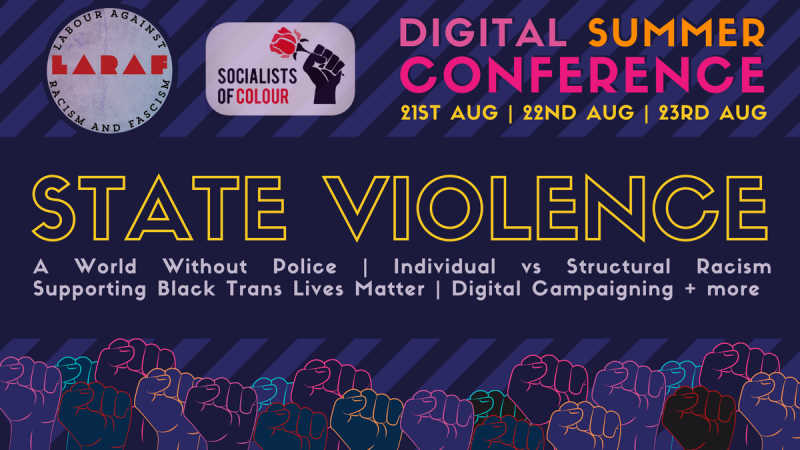
2020 has been a tumultuous year, and the Covid-19 pandemic may yet prove to be the defining event of the decade. But the urgency of the global Black Lives Matter (BLM) protests has recently eclipsed coronavirus, with BLM protesters even outnumbering those who participated in the iconic civil rights protests of the 1960s.
The injustice of George Floyd’s death and the anguish it provoked resonated profoundly with the experiences of Black and Asian communities in the UK. BLM activists are clear: the hollow promises of empty representation simply will not do. Instead, we have heard demands for structural changes and an end to violent interventions by the state – both at home and abroad. Academics, scholars and activists have long called for us to defund the police. The BLM movement has now catapulted those demands into the national conversation.
The appetite for change does not stop there. We must look further if we are to truly dismantle the systemic racism that permeates the British state and its institutions. The Home Office policy of creating a ‘hostile environment’ is racist state oppression, whether delivered by Amber Rudd and Theresa May or Priti Patel and Sajid Javid. And increasing stop and search capacity necessarily involves a reduction in the civil liberties of Black people, who are disproportionately targeted – even if Conservative London mayoral candidate Shaun Bailey does appear now to support its use.
Many are still firmly of the mindset that policing in this country is somehow untainted by the racism that informs its American counterpart, and uncritically accept the insistence that here we are “policed by consent”. That platitude is refuted by the deaths of scores of Black people who have come into police contact – Sean Rigg in 2008, Olaseni Lewis in 2010, Kingsley Burrell in 2011, Sarah Reed in 2016, Rashan Charles in 2017 – all without a single police officer being convicted.
Our society is infected by the intrusion of policing into our education system, mental health services and youth centres. This has been normalised under the guise of ‘protecting our safety and security’ and the shadow cast by ‘Prevent’, which creeps into every corner of the daily lives of our communities racialised by the state. It is in this context that we must view the death of Shukri Abdi, for which there has still been no justice.
What role does the Labour Party have to play in all of this? Firstly, there is an urgent need for us, as socialists, to be able to articulate and advocate for more than just simple, individualistic acts of performative anti-racism. A requirement to undertake ‘unconscious bias’ training serves no useful purpose if the system that perpetuates racism remains unchanged. There is a clear need for structural change through challenging state violence. The most important task for anti-racists is to liberate the oppressed, both at home and across the world, by building meaningful and resolute solidarity amongst all.
We will advance a way forward at our digital conference being held between August 21st and 23rd, hosted by Labour Against Racism And Fascism (LARAF) and Socialists of Colour (SoC). Our event is centred around challenging state violence. Through discussions and workshops, led by socialist leaders and grassroots campaigners across three days, we will explore crucial issues such as the strategy behind the call to defund the police and organising Black and Asian trade union power. Building on the success of last year’s event, which saw over 100 anti-racist and anti-fascist activists come together for a day-long programme, attendees can look forward to another inspiring summer conference this month.
One key message from last year’s conference, which will be particularly relevant under Keir Starmer’s leadership, is the need for Labour to ‘walk the walk’ on anti-racism. Anti-racists who look to the Labour Party to adopt the policies of grassroots campaigns are observing the new leader closely following the departure of Jeremy Corbyn. LARAF has sought to speak to the new party leadership about racism, but they appear to have chosen to ignore our representations. We instead received a response to our letter over six weeks later – a pro forma reply from the membership department that failed to address any of the concerns raised.
With Keir Starmer in June describing a major BLM demand as a “nonsense” and referring to the movement as a “moment”, in comments that he has since said he regrets, there can only be one call for anti-racists – to organise, both outside and inside the Labour Party.
If Labour stands as an anti-racist party, it must challenge state violence. More experienced anti-racists will no doubt remember dark days before Corbyn’s leadership, typified by the infamous ‘controls on immigration’ mugs, and will be expecting Starmer to maintain Corbyn’s resolute commitment to anti-racism – including upholding commitments in the first ever race and faith manifestos. He will have to work hard to prove that the party is not reverting to a discredited and cowardly capitulation towards racism.
To build an anti-racist Labour Party, Labour must listen to its anti-racists. It should start on August 21st-23rd at the LARAF and SoC summer conference Challenging State Violence.




More from LabourList
‘Council Tax shouldn’t punish those who have the least or those we owe the most’
Two-thirds of Labour members say government has made too many policy U-turns, poll reveals
‘Two states, one future: five steps on the path to peace for Israelis and Palestinians’